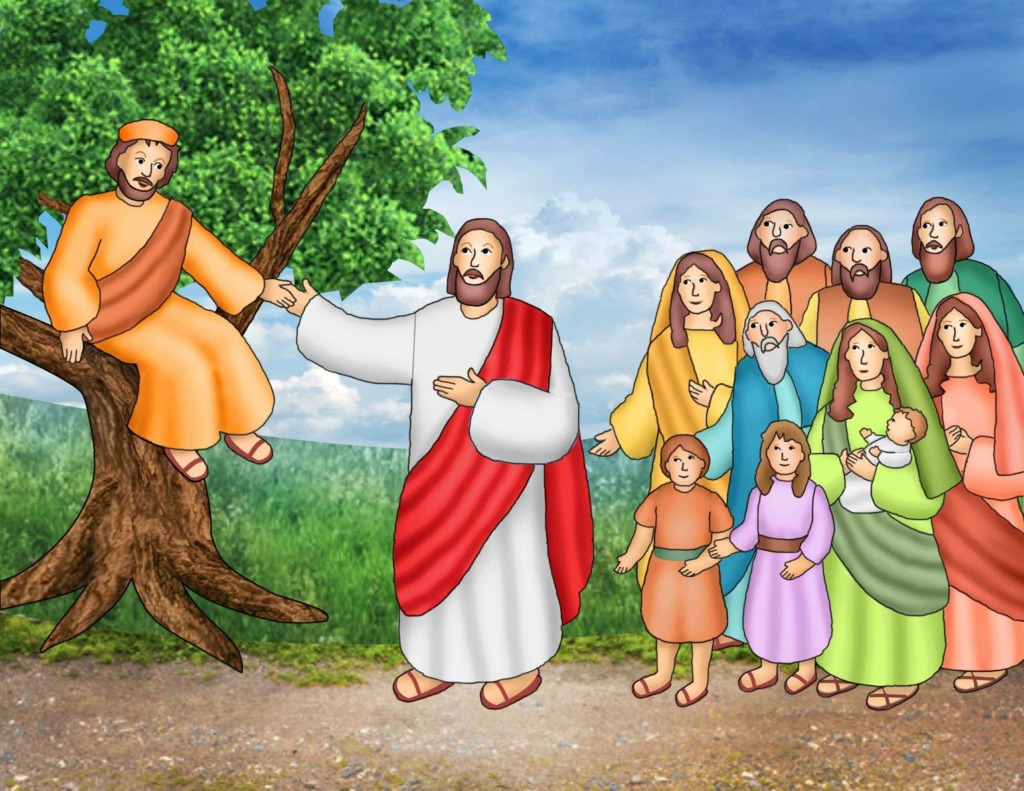CHILDREN’S STORY:
One day, Jesus and the apostles were traveling toward Jericho.
Along the way, a blind man was sitting by the roadside begging. He heard a crowd going by and learned that Jesus was coming.
“Jesus, Son of David, have pity on me!” the blind beggar shouted.
Jesus had the man brought to him and asked what he could do for him.
“Lord, please let me see,” he answered.
“Have sight; your faith has saved you,” Jesus said as the man’s sight was restored.
As Jesus and his friends entered Jericho, a resident of the city named Zacchaeus was eagerly awaiting his chance to see Jesus.
But Zacchaeus, a wealthy chief tax collector, was short in stature and could not see over the crowd.
So, he decided to run ahead, climb a sycamore tree and wait for Jesus to pass by.
When Jesus came near the tree that Zacchaeus had climbed, he looked up.
“Zacchaeus, come down quickly, for today I must stay at your house,” Jesus said.
Zacchaeus immediately scrambled down from the tree and received Jesus with joy.
When people in the crowd heard and saw what was going on, they began to grumble.
“He has gone to stay at the house of a sinner,” they complained.
Zacchaeus knew that the people of Jericho thought badly of him because he was a tax collector.
During Jesus’ time, some of the most hated people were tax collectors. Not only did they work to collect tax money from fellow Jews on behalf of the oppressive Roman Empire, they greedily charged more than was owed and kept the extra money for themselves.
Zacchaeus looked at Jesus.
“Behold, half of my possessions, Lord, I shall give to the poor, and if I have extorted anything from anyone I shall repay it four times over,” he declared.
Jesus looked pleased with what Zacchaeus had promised.
“Today salvation has come to this house because this man too is a descendant of Abraham,” Jesus said. “For the Son of Man has come to seek and to save what was lost.”
READ MORE ABOUT IT:
Luke 19
Q&A
1. What did Zacchaeus do so he could see Jesus?
2. At whose house did Jesus want to stay in Jericho?
ESSAY: Describe a time when you reached out to a person who others had shunned.
BIBLE ACCENT:
Tax collectors are mentioned quite a few times in the New Testament.
For example, in Luke 5:27-32, we read that Jesus called the tax collector Levi — also known as Matthew — to be one of his apostles.
After he was called, Levi gave a great banquet for Jesus. There were many tax collectors dining at the table with them.
The Pharisees and scribes complained that Jesus was eating with tax collectors and sinners. But Jesus said he came to call sinners to repentance, not the righteous.
In Luke 18, we can read a parable that Jesus told about a tax collector and a Pharisee.
One day, a Pharisee and a tax collector came to the Temple area to pray, Jesus said.
“O God, I thank you that I am not like the rest of humanity — greedy, dishonest, adulterous — or even like this tax collector. I fast twice a week, and I pay tithes on my whole income,” the Pharisee prayed.
The tax collector, on the other hand, stood off at a distance and wouldn’t raise his eyes toward heaven. As he beat his breast, he prayed, “O God, be merciful to me a sinner.”
Jesus said that the tax collector went home justified, because “everyone who exalts himself will be humbled, and the one who humbles himself will be exalted.”
SPOTLIGHT ON THE SAINTS:
St. Francis Anthony of Lucera
Giovaniello Fasani was born in Italy in 1681. He was educated by the Franciscans in Lucera, joined the order at age 15 and took the name Francis Anthony.
He earned a doctorate in theology in 1705 and taught at the Franciscan college in Lucera for the rest of his life. He was renowned for his teaching, his preaching and his mercy. He also was concerned for the well-being of the poor and prisoners.
St. Francis Anthony died in 1742, and we remember him on Nov. 29.
PUZZLE:
Using the hints provided, fill in the blanks in the sentences about tax collectors and paying taxes.
1. Doesn’t your teacher pay the ______ tax? (Matthew 17:24)
2. If he refuses to listen even to the church, then treat him as you would a ______ or a tax collector. (Matthew 18:17)
3. The tax collectors and ______ were all drawing near to listen to him. (Luke 15:1)
4. This is why you also pay taxes, for the ______ are ministers of God. (Romans 13:6)
Answers: 1. Temple; 2. gentile; 3. sinners; 4. authorities

